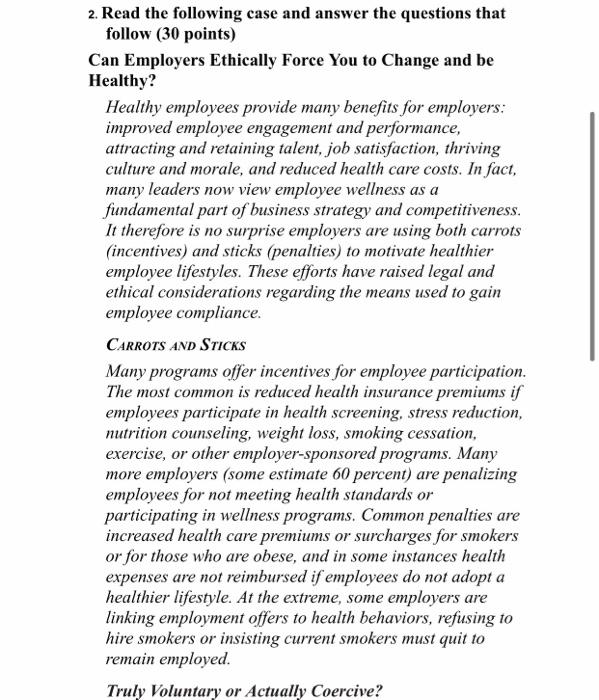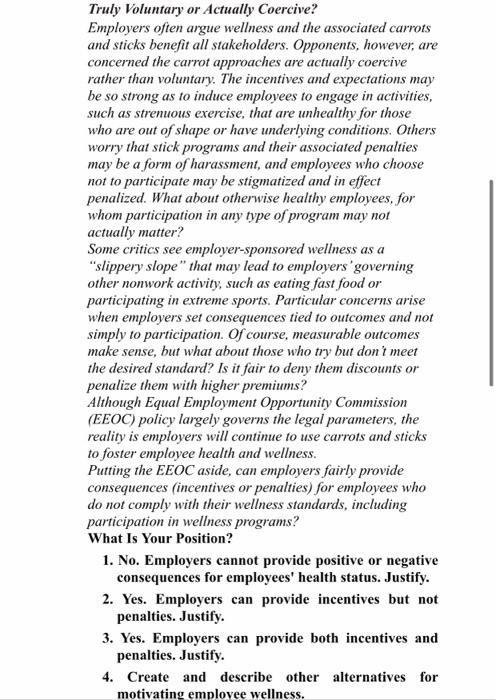2. Read the following case and answer the questions that follow (30 points) Can Employers Ethically Force You to Change and be Healthy? Healthy employees provide many benefits for employers: improved employee engagement and performance, attracting and retaining talent, job satisfaction, thriving culture and morale, and reduced health care costs. In fact, many leaders now view employee wellness as a fundamental part of business strategy and competitiveness. It therefore is no surprise employers are using both carrots (incentives) and sticks (penalties) to motivate healthier employee lifestyles. These efforts have raised legal and ethical considerations regarding the means used to gain employee compliance. CARROTS AND STICKS Many programs offer incentives for employee participation. The most common is reduced health insurance premiums if employees participate in health screening, stress reduction, nutrition counseling, weight loss, smoking cessation, exercise, or other employer-sponsored programs. Many more employers (some estimate 60 percent) are penalizing employees for not meeting health standards or participating in wellness programs. Common penalties are increased health care premiums or surcharges for smokers or for those who are obese, and in some instances health expenses are not reimbursed if employees do not adopt a healthier lifestyle. At the extreme, some employers are linking employment offers to health behaviors, refusing to hire smokers or insisting current smokers must quit to remain employed Truly Voluntary or Actually Coercive? Truly Voluntary or Actually Coercive? Employers often argue wellness and the associated carrots and sticks benefit all stakeholders. Opponents, however, are concerned the carrot approaches are actually coercive rather than voluntary. The incentives and expectations may be so strong as to induce employees to engage in activities, such as strenuous exercise, that are unhealthy for those who are out of shape or have underlying conditions. Others worry that stick programs and their associated penalties may be a form of harassment, and employees who choose not to participate may be stigmatized and in effect penalized. What about otherwise healthy employees, for whom participation in any type of program may not actually matter? Some critics see employer-sponsored wellness as a "slippery slope" that may lead to employers governing other nonwork activity, such as eating fast food or participating in extreme sports. Particular concerns arise when employers set consequences tied to outcomes and not simply to participation. Of course, measurable outcomes make sense, but what about those who try but don't meet the desired standard? Is it fair to deny them discounts or penalize them with higher premiums? Although Equal Employment Opportunity Commission (EEOC) policy largely governs the legal parameters, the reality is employers will continue to use carrots and sticks to foster employee health and wellness. Putting the EEOC aside, can employers fairly provide consequences (incentives or penalties) for employees who do not comply with their wellness standards, including participation in wellness programs? What Is Your Position? 1. No. Employers cannot provide positive or negative consequences for employees' health status. Justify. 2. Yes. Employers can provide incentives but not penalties. Justify. 3. Yes. Employers can provide both incentives and penalties. Justify. 4. Create and describe other alternatives for motivating emplovee wellness. 2. Read the following case and answer the questions that follow (30 points) Can Employers Ethically Force You to Change and be Healthy? Healthy employees provide many benefits for employers: improved employee engagement and performance, attracting and retaining talent, job satisfaction, thriving culture and morale, and reduced health care costs. In fact, many leaders now view employee wellness as a fundamental part of business strategy and competitiveness. It therefore is no surprise employers are using both carrots (incentives) and sticks (penalties) to motivate healthier employee lifestyles. These efforts have raised legal and ethical considerations regarding the means used to gain employee compliance. CARROTS AND STICKS Many programs offer incentives for employee participation. The most common is reduced health insurance premiums if employees participate in health screening, stress reduction, nutrition counseling, weight loss, smoking cessation, exercise, or other employer-sponsored programs. Many more employers (some estimate 60 percent) are penalizing employees for not meeting health standards or participating in wellness programs. Common penalties are increased health care premiums or surcharges for smokers or for those who are obese, and in some instances health expenses are not reimbursed if employees do not adopt a healthier lifestyle. At the extreme, some employers are linking employment offers to health behaviors, refusing to hire smokers or insisting current smokers must quit to remain employed Truly Voluntary or Actually Coercive? Truly Voluntary or Actually Coercive? Employers often argue wellness and the associated carrots and sticks benefit all stakeholders. Opponents, however, are concerned the carrot approaches are actually coercive rather than voluntary. The incentives and expectations may be so strong as to induce employees to engage in activities, such as strenuous exercise, that are unhealthy for those who are out of shape or have underlying conditions. Others worry that stick programs and their associated penalties may be a form of harassment, and employees who choose not to participate may be stigmatized and in effect penalized. What about otherwise healthy employees, for whom participation in any type of program may not actually matter? Some critics see employer-sponsored wellness as a "slippery slope" that may lead to employers governing other nonwork activity, such as eating fast food or participating in extreme sports. Particular concerns arise when employers set consequences tied to outcomes and not simply to participation. Of course, measurable outcomes make sense, but what about those who try but don't meet the desired standard? Is it fair to deny them discounts or penalize them with higher premiums? Although Equal Employment Opportunity Commission (EEOC) policy largely governs the legal parameters, the reality is employers will continue to use carrots and sticks to foster employee health and wellness. Putting the EEOC aside, can employers fairly provide consequences (incentives or penalties) for employees who do not comply with their wellness standards, including participation in wellness programs? What Is Your Position? 1. No. Employers cannot provide positive or negative consequences for employees' health status. Justify. 2. Yes. Employers can provide incentives but not penalties. Justify. 3. Yes. Employers can provide both incentives and penalties. Justify. 4. Create and describe other alternatives for motivating emplovee wellness








